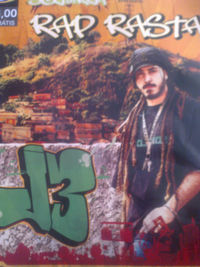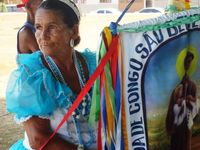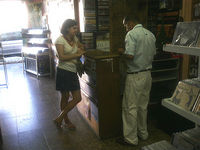Message from Brazil6 - Rappin' Da Rua!
Tagged with: Jota 3 J3 Rap Hiphop Vitoria Espirito Santo Rap Rasta Sou Da Rua Rappin Hood Racionais MC Gabriel Pensador Marcelo D2 MC Marechal Cidade Negra Ja Rule Reggae Tessa Burwood WorldMusic.co.uk
Last night I met up with Jota 3 (www.myspace.com/rapperj3) - a hard working and well respected MC, singer and producer, originally from Rio, who was brought up in Vitoria. Totally chilled out and full of good vibes. He’s worked alongside some of Brazil's best known hip hop and reggae artists, including Racionais MCs, Gabriel Pensador, Marcelo D2, MC Marechal and Cidade Negra, as well as Ja Rule. He's just returned from Barcelona, where he recorded his latest album “Rap Rasta”.
The coolest thing about “Rap Rasta” - apart from the unabashedly positive, rootsy vibe and quite natural production, is the way Jota 3 has chosen to distribute his work. The album is available for R$6 (about £2.50) at news stands across Espirito Santo, along with a double sided fold out fanzine called “Sou da Rua” (I'm From The Street), which features articles about local street artists, an interview with Rappin' Hood (www.myspace.com/rappinhood) - who is also the special guest on “Rap Rasta” - along with Jota 3's biography, and information on the hip hop and music workshops he carries out in state schools across Vitoria.
This is a truly indie hip hop way to get one's work out into the world. Jota 3 will be touring Europe again next year, if I have any small say in it, he's coming to Brum for sure!
Tessa Burwood for WorldMusic.co.uk
(Photos of street art and graffiti in Vitoria, by Tessa)
Message from Brazil5 - Espirito Santo & Fenova
Tagged with: Espirito Santo Sebrae Instituo Quorum Espirito Mundo capixaba Fenova Nova Almeida Ticumbi Folia de Reis Baile de Congo Sao Benedito Conceição da Barra Tessa Burwood WorldMusic.co.uk
"There's a phrase I've been hearing a lot recently around these parts - "Eu vou summer do mapa!" (“I’m disappearing from the map!”). Well, as far as Salvador's concerned, that's just what I did. I caught the first bus I could out of town to Vitoria, in the State of Espirito Santo, (400 miles to the South). Three years ago I was leaving Seville almost as quickly, in a taxi shared with two lovely Brazilians - Aline and Berto. We spent the night in Granada together, wandering into the Boogaloo Club, playing snooker, negotiating spontaneous mountain trips with slightly surprised and unassuming students. The next morning, Berto said, "One day, you'll come and stay at mine," and that's just what I've ended up doing.
Berto works for SEBRAE (sebrae.com.br/) - a national governmental organisation that exists to support and encourage the growth of small businesses. Specialising in the area of tourism and culture, Berto worked with Aline Yasmin from Instituto Quorum (www.institutoquorum.org.br) to start up the Espirito Mundo project (www.espiritomundo.com) three years ago, which aims to strengthen relations between the cultural production of the state of Espirito Santo and their expressions in other cultures around the world. Today he's organising the office barbecue, which also seems quite stressful, so I left him to it. Instituto Quorum is a third sector, not-for-profit cultural production company that works to promote "musica capixaba" (music from Espirito Santo), as well as bringing music from all over the world to the state.
"Here", smiles Aline, (who founded the Institute back in October 2005), ”We’re a family, we laugh and cry together, give each other lots of support, and create really beautiful projects."
Right now, Aline, Samya and Zappie Pimental are in the final stages of organising Fenova (Festival Internacional de Musica de Nova Almeida) - a festival held in February each year. 50,000 people come together for five days at Igreja dos Reis Magos in Serra, Nova Almeida, about 20 miles North of the state capital, Vitoria. The church stands on the site where evangelist missionary Brás Lourenço began preaching to the native Tupiniquin tribe back in 1557, in a palm leaf hut. During the day, workshops on everything from baroque violin to Brazilian piano, trumpet and folklore within education are held in the church, along with orchestra rehearsals with children from local schools.
During the night, ‘musica erudita’ (erudite music, which I suppose equates to what we'd call 'high art'), popular and folkloric celebrations are performed on a series of stages in and around the church. On the closing night, the children's orchestra comes together to perform the piece they've spent five days learning together. The lineup for February 2011 is yet to be confirmed, but the 2010 event featured the folkloric performances of 'Ticumbi' and 'Folia de Reis'.
Otherwise known as Baile de Congo de São Benedito (St. Benedict's Congo Dance), Ticumbi is a traditional celebration that takes place each New Year in the town of Conceição da Barra, which is further North (near the border of the States of Espirito Santo and Bahia). Afro Brazilian legend has it that o Rei de Bamba (King Bamba) asks o Rei de Congo (King Congo), for his daughter's hand in marriage. King Congo is not best pleased, and they have a big old battle. Somehow, this is all mixed up with a competition to see who is more devout to St. Sebastian - in the grand Brazilian tradition of plural religious symbolism, which has already fried my small brain. This is commemorated with a musical procession through Conceição da Barra. Folia de Reis is a traditional Catholic procession of the Three Wise Men brought to Brazil by the Portuguese, and still practiced widely in both countries.
FENOVA is a massive event to organise, which is why Instituto Quorum (whose earnest tagline is 'Organising with Responsibility') is one of only three cultural institutes across Brazil chosen by the government as professional representatives to meet regularly in Brasilia at the Ministry of Culture. As well as being a great responsibility to act as an ethical voice for Brazilian culture, it is also recognition of the Institute's best practice. I know this may sound like the naive point of view of a foreigner who sees things from the outside through rose-tinted spectacles, but cultural production here in Brazil (and especially here at Institute Quorum) is of a very high calibre, and I think the UK has a great deal to learn from it. Attitudes are much more proactive, there's more of a 'can do' culture. I asked Aline about this yesterday, explaining how things work in the UK, and the recent changes in the Arts Council.
She was pretty forthright in her response: "Brazil has always been in crisis, so we just get on with it. There's always a way, it's always a battle, but you just have to believe in what you do, and things turn out well."
Instituto Quorum plan to open an internship next year for a student from the UK, to work within their organisation. If I were back at uni now, I'd jump at the chance."
Tessa Burwood for WorldMusic.co.uk
Photos by Zappie Pimental
(www.zapeadordefrequencia.blogspot.com/)
Message from Brazil4 - National Samba Day
Tagged with: Samba Bahia Brazil Salvador Pelourinho Mercado Cultural Sinho Ary Barroso Na Baixa do Sapateiro Luis Monteiro de Costa Black Style Chuva de Perereca Tessa Burwood WorldMusic.co.uk world music pagode
December 2nd was O Dia Nacional do Samba (National Samba Day). I missed it, having just arrived here, and wanted to find out more about it, so I've been doing some research, and asking around. Its origins and motives make an interesting comparison to the Mercado Cultural music festival.
Mercado Cultural is a really interesting concept for a festival – the culmination of a year-round caravan of musicians, producers, managers and cultural representatives from various genres, who travel throughout Brazil and abroad, to perform, discuss and disseminate their work. The aim is to explore the challenges of maintaining a truly fruitful intercultural dialogue. Beyond race and language, this caravan also unites people across the most obvious, yet nuanced and difficult barrier we face today – the socioeconomic divide.
Here in Brazil, this divide is much more difficult to cross, although in recent years the expanding middle class has begun to link the two uncomfortably coexisting worlds – the very rich minority, and the penniless majority. Sharing music is a fascinating, at times problematic, but ultimately positive method of bringing these worlds together. Brazil is, after all, synonymous with samba, and samba evolved from the work songs and spirituals sung by African slaves in Bahia. As I briefly touched on in the previous article, it was the influx of poor Bahian workers into Rio during the late 19th – early 20th century that first brought samba to the ears of well off, white Brazilians.
Sinhô and his contemporaries became the intermediaries between these two cultures, because they were tacitly accepted by both worlds. That said, a good measure of prejudice has always tempered this upper class fascination with samba. Sinhô's derogatory comments on Bahian people, and his willingness to appropriate their music while taking the credit, polarise the dividing line between Bahia and Rio, rich and poor, black and white, through cold rejection.
But there is another, more subtle and ultimately sinister way to exclude a culture, and that is to exoticise and objectify it. While Sinhô stole from Bahian samba singers and claimed their songs for himself, while openly criticising what he saw as an uncultured and backward Bahian race, his contemporary and neighbour Ary Barroso described a scene of sexual longing between a white woman from Rio and a dark skinned man from Salvador, in a city he had never seen. "Na Baixa do Sapateiro" is the story of a woman looking for love in Salvador. She meets a dark skinned Bahian man lazing in the shade in Baixa do Sapateiro, and tries unsuccessfully to seduce him.
Now a busy shopping district between Pelourinho, Saude and Barroquinha, Baixa do Sapateiro was, at one time, the home of an Italian shoe manufacturer – hence the name ('sapateiro' means shoemaker). It's fame spread throughout Brazil when three cinemas ran there simultaneously, and Ary Barroso (who wrote music for film) presumably identified with the area, despite not setting foot in Bahia, let alone Salvador, until years later. Here's a translation of the samba he wrote:
Bahia, happy dark skinned land,
I miss you like mad!
Our Lord of Bomfim,
Find me another man with dark skin
Just the same, just for me.
In Baixa do Sapateiro
I came across one day,
A lazy dark skinned man from Bahia
I asked him for a kiss, he refused
An embrace, and he just smiled
I asked for his hand
He would not give it
And ran away...
Bahia, happy dark skinned land,
I miss you like mad!
Our Lord of Bomfim,
Find me another man with dark skin
Just the same, just for me.
In the 1940s, this samba's fame spread to the ears of a local councillor in Salvador, whose name was Luis Monteiro da Costa. Inspired by the song – or perhaps frustrated, who knows - he founded O Dia Nacional do Samba (National Samba Day.) This day falls on December 2nd, and was originally only celebrated in Salvador – in recognition of samba's origin. More recently, it became a national holiday, and is now celebrated across Brazil.
Meanwhile, 'Na Baixa do Sapateiro' entered decisively into the Brazilian canon, interpreted by famous singers like Elis Regina and João Gilberto. It is emblematic of a vision of Bahia repeated in Brazilian popular music – that Bahian people are docile, lazy and sexually available. Although in the case of this samba, the Bahian man refused such advances, there's something sinister in the air here in Salvador. Sex tourism is rife here, and male prostitution is particularly noticable.
I walk through Terreiro de Jesus in Pelourinho, past the men practicing capoeira in the square and calling out to female tourists. In Praça da Sé, a leather skinned Italian woman drags a local mixed race guy by the hand into the entrance of a hotel. In Baixa do Sapateiro, I hear music blasting from speakers on a pirate CD salesman's truck: a song from Bahian pagode star Black Style's latest album (eponymous), called "Chuva de Perereca" (‘It’s Raining P**sy’). On the front cover of the CD, Black Style sings to a stadium packed out with screaming female fans. I feel quite embarrassed – more of a prude than I thought :)
Tessa Burwood for WorldMusic.co.uk
Message from Brazil 1 - Vinyl Pelourinho
Tagged with: Brazil Pelourinho Bahia Salvador Planet Music Ajuda 39 MPB musica sertaneja forro samba bossa nova Caetano Veloso Ce Eterna Dimensao Zeca Pagodinho Tessa Burwood WorldMusic.co.uk World Music
This is the first report from our own correspondent Tessa Burwood who's currently out in Brazil. Tess will be sending in her reports as to what she sees, muses and gets up to over the next three weeks. In this one she's arrived in the city of Salvador in Bahia, Northern Brazil (traditionally cited as the most African of all Brazilian states) and set up base in the old slave area of Pelourinho, one of the most culturally vibrant areas of the city:
"Who said music shops were dead?"
"Who said music shops were dead? Planet Music and Ajuda 39 in Pelourinho are in a healthy state.
Avelar began working at Planet Music as a kid, because he spent so much time in there flicking through records that the shop assistant told him to go speak to the boss:
"From shop rat to boss via passion for music - I love my job!"
There's an exhaustive collection of MPB, musica sertaneja, forro, samba, everything you can think of when it comes to the music loving public that pass through Pelourinho. Apparently, the French always ask for bossa nova,
"Just as elegant as they like to think they are," says Avelar with a wry grin.
"German tourists don't like Brazilian music at all. They only buy CDs as presents for the folk back home, hardly even look at the covers or ask any questions. What can I say? They just don't dig us!"
Avelar's favourites include Pink Floyd and Kraftwerk, he knows all the dates of birth of everyone in the former, and listened to the latter when, during the Cold War the airwaves were flooded with American music, and anything deemed transgressive was contraband.
He was pleased to tell me that Caetano Veloso recently made up 500 copies of his seminal album "Ce" on vinyl for his closest 500 friends. Sony have opened a vinyl production unit down south, apparently.....
Round the corner at Ajuda 39, it's a vinyl purist's heaven - as you can see from the photos. Tekko works behind the counter by day and plays samba by night in a band called Eterna Dimensao. They're playing on Sunday in Rio Vermelho, I'm going to check them out. I asked him what was his favourite record in the whole shop, and it seemed he'd been mooning over it all afternoon! Zeca Pagodinho :)
Tomorrow, percussion class at 2pm, who knows where my rhythm's at?! "
Tessa Burwood for WorldMusic.co.uk
[There will be more from Tessa as she moves around Brazil in the next three weeks, including a trip to the remote settlement of São Braz in Bahia state to check out a village whose entire culture has been officially protected by the United Nations. Stay tuned.]
1


























